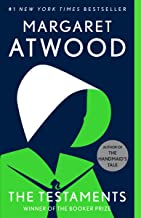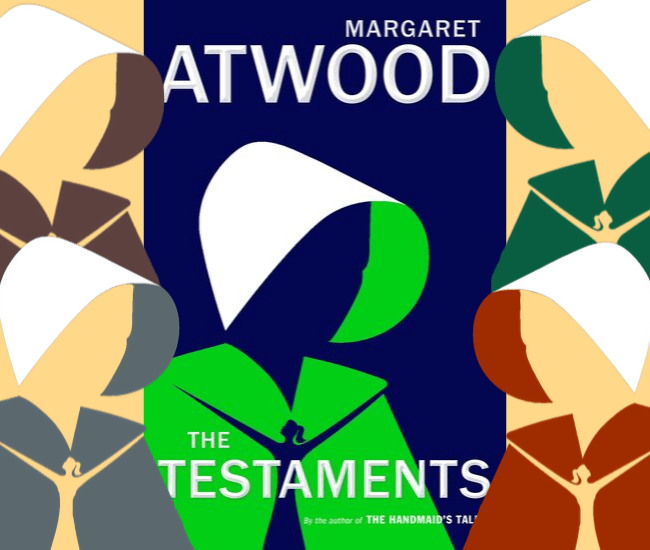The Testaments by Margaret Atwood
Just three pages into Margaret Atwood’s The Testaments (Nan A. Talese) is a short phrase that signals a major theme: “writing can be dangerous.”
The narrator is Aunt Lydia, founder of the system that trains girls for their future roles in the misogynistic theocracy that has replaced the United States. Gilead separates women into categories — Wives, who are the privileged spouses of powerful men; Handmaids, those women able to bear children after a disaster causes infertility in many; servants called Marthas; and instructors called Aunts.
Is it any coincidence that on the heels of the book’s release comes Banned Books Week (Sept. 22-28)? An annual list of the year’s most banned books compiled by the American Library Association’s Office for Intellectual Freedom is usually 10 titles long. The latest list has 11.
In a 2017 interview with The New Yorker, Atwood noted that a dictatorship usually shuts down independent media, especially if it expresses criticism of the dictatorship, or promotes democracy. “There are still places on this planet where to be caught reading you, or even me, would incur a severe penalty.”
Atwood has often said that the plot lines of her speculative fiction are not imaginings, but a reconfiguring of events that have already happened in the world.
In The Testaments, Gilead’s bureaucracy has rewritten The Bible and put certain books under lock and key. These include such classics as Jane Eyre, Anna Karenina, Tess of the d’Urbervilles, Paradise Lost and Lives of Girls and Women. (The last, a fictionalized memoir by Alice Munro, is Atwood’s nod to a fellow Canadian author who was awarded the 2013 Nobel Prize in Literature.)
“What a moral panic each one of them [the banned books] would cause if set loose among the Supplicants!” muses Aunt Lydia of the young women who will become Aunts.
As A.J. Liebling famously wrote in 1960, “Freedom of the press is guaranteed only to those who own one.”
Before the coup that abolished the U.S. Constitution and set up total control, Aunt Lydia was a judge. Afterward, rounded up with other professional women, she chose compliance with Gilead over death. “The opposition is led by the educated, so the educated are the first to be eliminated,” she says. But Aunt Lydia is now a secret traitor, keeping a record of incriminations that could bring down Gilead, or lead to her death if discovered.
Summoned to a meeting with the Commander in charge of the Eyes, Gilead’s secret police, she arrives at its headquarters, a “former grand library. It shelters no books but their own, the original contents having been burned or, if valuable, added to the private collections of various sticky-fingered Commanders.”
Aunt Lydia is one of three narrators of The Testaments, their accounts separated into alternating sections. Another is Agnes, the daughter of a Gilead Commander and his wife. Her father’s study, she recalls, had “little pretend books” with blank pages. “My mother said that books were decorations, like vases of flowers.”
In contrast to the blank pages and locked books of Gilead, the third narrator of The Testaments is a Canadian girl named Daisy who reads Colette’s Mitsou in French class. It’s “about a music hall star hiding a couple of men in her wardrobe,” she comments. She thinks it sounds like a good idea.
Atwood’s 1985 The Handmaid’s Tale, now the basis for the Emmy-winning TV series, was written as she noticed the religious right becoming more politically powerful in the United States. The Testaments is more of a page-turner, an answer to what happens after fundamentalists take over.
Aunt Lydia schemes and plots her revenge. Her silver-clad Pearl Girls missionaries in Canada are secret Gilead spies. Too many women have been escaping north via the Femaleroad, and a resistance group, MayDay, is fighting to overthrow Gilead. Offred, the Handmaid’s narrator, has been declared a terrorist. (She’s alive!)
Gilead’s demand for the return of Baby Nicole, kidnapped child of a top-level Commander taken into Canada, has become a flashpoint in relations between the two countries.
Agnes is destined to become a Wife, a fate she loathes, but at the last moment is encouraged by Aunt Lydia to become an Aunt. Daisy is recruited by the resistance. Together they — but that would be giving away too much of the plot. And, based on the sales of The Testaments and waiting lists at libraries, you’re probably reading it now.
The Testaments is now available.
Buy this Book!
Amazon




